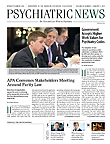The chapter on disruptive, impulse control, and conduct disorders is new to DSM-5. It combines disorders that were previously included among disorders usually first diagnosed in infancy, childhood, or adolescence (that is, oppositional defiant disorder [ODD]; conduct disorder; other specified and unspecified disruptive, impulse-control, and conduct disorders) or impulse-control disorders not otherwise specified (that is, intermittent explosive disorder). These disorders are all characterized by problems in emotional and behavioral self-control.
Of note, attention-deficit/hyperactivity disorder (ADHD) is frequently comorbid with the disorders in this chapter but is listed with neurodevelopmental disorders. The criteria for ODD are largely unchanged from DSM-IV-TR. The criteria for conduct disorder are also largely unchanged from DSM-IV-TR. A descriptive-features specifier has been added for individuals who meet full criteria for the disorder and who also present with limited prosocial emotions. The primary change in DSM-5 for intermittent explosive disorder is what type of aggressive outbursts should be considered: DSM-IV-TR required physical aggression, whereas in DSM-5 verbal aggression and nondestructive/noninjurious physical aggression also meet criteria.
An important departure from past diagnostic manuals is that the substance-related and addictive-disorders chapter is expanded to include gambling disorder. This reflects the increasing and consistent evidence that some behaviors, such as gambling, also activate the same reward system with effects similar to those of drugs of abuse.
The questions below are from
DSM-5 Self-Exam Questions: Test Questions for the Diagnostic Criteria, which may be preordered from American Psychiatric Publishing at
http://www.appi.org/SearchCenter/Pages/SearchDetail.aspx?ItemId=62467. The answers and rationales are posted at
http://www.psychnews.org/pdfs/DSM-5_Self_Examination_QandA_18.pdf. The book, available in February, contains 500 questions for all the categories of psychiatric disorders and includes Section III. The questions were developed under the leadership of Philip Muskin, M.D., a professor of clinical psychiatry at Columbia University College of Physicians and Surgeons. APA members may purchase the book at a discount.
1. Which of the following is new in DSM-5 for the diagnosis of ODD?
a) Categorization of ODD symptoms<br /> b) Failure to resist an impulse, drive, or temptation to perform an act that is harmful to the person or to others<br /> c) The individual feels an increasing sense of tension or arousal before the act, pleasure, gratification, or relief during the act<br /> d) The individual experiences a sense of relief from the urge after the act<br /> e) Premeditation of the act
2. Which disorder is most commonly comorbid with ODD?
a) ADHD<br /> b) Mood disorder<br /> c) Conduct disorder<br /> d) Bipolar disorder<br /> e) Learning disorders
3. A 21-year-old male with history of ODD presents with frequent impulsive behavioral outbursts that are grossly out of proportion to the stressor. He reports that he is unable to control himself and worries that he might lose his job if this behavior continues. What is his most likely diagnosis?
a) Bipolar disorder<br /> b) ADHD<br /> c) Intermittent explosive disorder<br /> d) Conduct disorder<br /> e) Adjustment disorder ■
